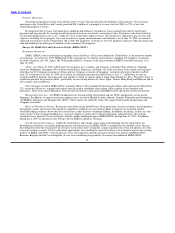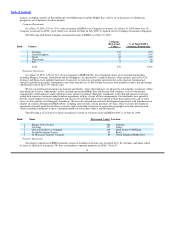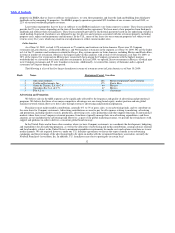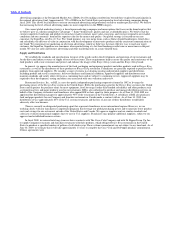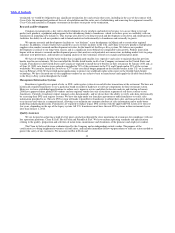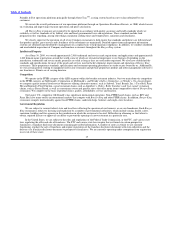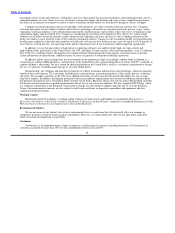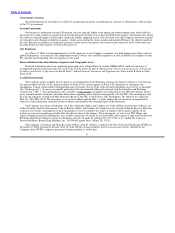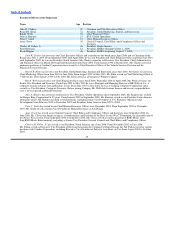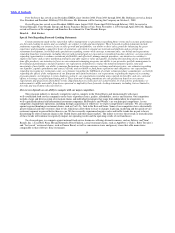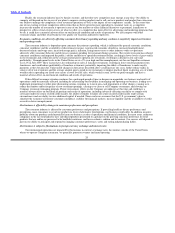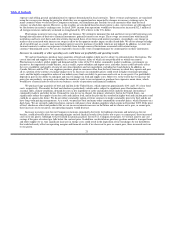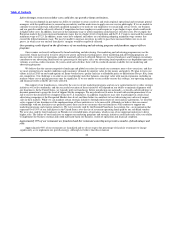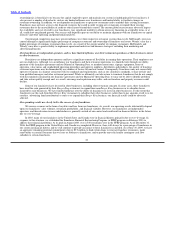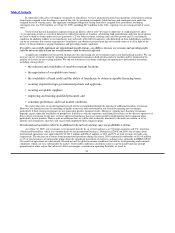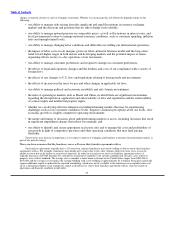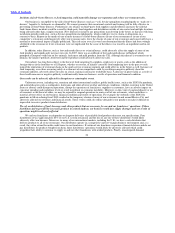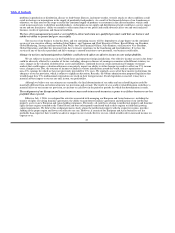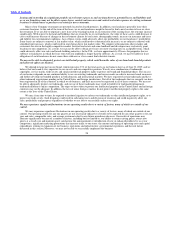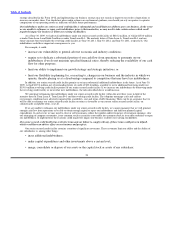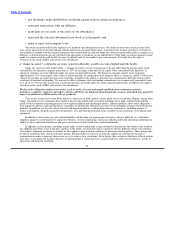Burger King 2009 Annual Report Download - page 22
Download and view the complete annual report
Please find page 22 of the 2009 Burger King annual report below. You can navigate through the pages in the report by either clicking on the pages listed below, or by using the keyword search tool below to find specific information within the annual report.
Table of Contents
Finally, the restaurant industry has few barriers to entry, and therefore new competitors may emerge at any time. Our ability to
compete will depend on the success of our plans to improve existing products and to roll−out new products and product line extensions,
our ability to manage the complexity of our restaurant operations as well as the impact of our competitors’ actions. To the extent that
one of our existing or future competitors offers items that are better priced or more appealing to consumer tastes or a competitor
increases the number of restaurants it operates in one of our key markets or offers financial incentives to personnel, franchisees or
prospective sellers of real estate in excess of what we offer, or a competitor has more effective advertising and marketing programs than
we do, it could have a material adverse effect on our financial condition and results of operations. We also compete with other
restaurant chains and other retail businesses for quality site locations and hourly employees.
Economic conditions are adversely affecting consumer discretionary spending and may continue to negatively impact our business
and operating results.
The restaurant industry is dependent upon consumer discretionary spending, which is influenced by general economic conditions,
consumer confidence and the availability of discretionary income. A protracted economic slowdown, increased unemployment,
decreased salaries and wage rates, increased energy prices, inflation, rising interest rates or other industry−wide cost pressures
adversely affect consumer behavior and decrease consumer spending for restaurant dining occasions. The current recession has reduced
consumer confidence and impacted the public’s ability and desire to spend discretionary dollars, resulting in lower levels of guest traffic
in our restaurants and a reduction in the average amount guests spend in our restaurants, resulting in a decline in our sales and
profitability. Unemployment levels in the United States are at a 25−year high and the unemployment rate for our SuperFan customers
was 12% in July 2009. These factors have also reduced gross sales at franchise restaurants, resulting in lower royalty payments from
franchisees, and could reduce profitability of franchise restaurants, potentially impacting the ability of franchisees to make royalty
payments as they become due. Unfavorable changes in the factors described above could increase our costs, further reduce traffic in
some or all of our restaurants and the average amount guests spend in our restaurants or impose practical limits on pricing, any of which
would result in spreading our fixed costs across a lower level of sales, which would, in turn, lower our profit margins and have a
material adverse effect on our financial condition and results of operations.
If this difficult economic situation continues for a prolonged period of time or deepens in magnitude, our business and results of
operations could be materially affected, including by constraining our flexibility in managing and operating our business, leading us to
implement promotional or other price discounting actions, requiring us to incur non−cash impairment or other charges, causing us to
reduce the number and/or frequency of new restaurant openings, causing us to close or sell Company restaurants, and slowing our
Company restaurant reimaging program. Future recessionary effects on the Company are unknown at this time and could have a
material adverse effect on our financial position and results of operations, including adversely affecting our ability to comply with
covenants under our senior secured credit facility, the ability of lenders to honor our senior secured credit facility under certain
circumstances and our ability to raise additional capital, if needed. There can be no assurance that the U.S. government’s plan to
stimulate the economy will restore consumer confidence, stabilize the financial markets, increase liquidity and the availability of credit
or result in lower unemployment.
Our business is affected by changes in consumer preferences and perceptions.
The restaurant industry is affected by consumer preferences and perceptions. If prevailing health or dietary preferences and
perceptions cause consumers to avoid our products in favor of alternative food options, our business could suffer. In addition, negative
publicity about our products could materially harm our business, results of operations and financial condition. In recent years, numerous
companies in the fast food industry have introduced products positioned to capitalize on the growing consumer preference for food
products that are and/or are perceived to be healthful, nutritious, and low in calories, sodium and fat content. Our success will depend in
part on our ability to anticipate and respond to changing consumer preferences, tastes and eating and purchasing habits.
Our business is subject to fluctuations in foreign currency exchange and interest rates.
Our international operations are impacted by fluctuations in currency exchange rates. In countries outside of the United States
where we operate Company restaurants, we generally generate revenues and incur operating
20


